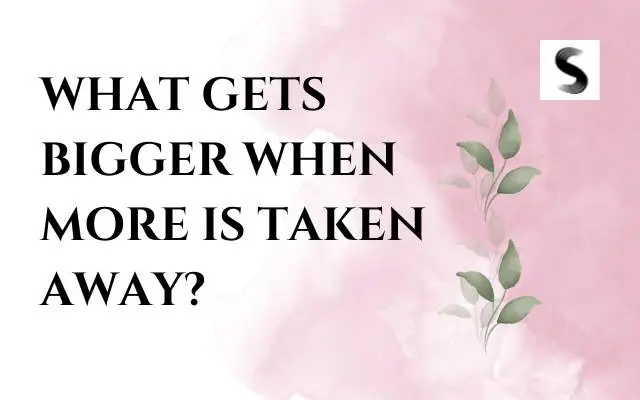Often, the things we don’t see or the missing parts create a powerful effect, an intriguing play of perceptions. That is precisely the paradoxical nature of the question we will explore in this composition.
So, buckle up for an exciting journey into philosophy, art, science, and economics as we dive deep into understanding this fascinating paradox of Absence.
Unraveling the Riddle
Let’s start by answering the question: What gets bigger when more is taken away? The answer is a hole.’ When you dig a hole, the more you take down, the bigger it gets.
This paradox isn’t just about a literal hole in the ground—it’s a metaphor for a profound philosophical concept.
The Concept of ‘Absence Making More’
The concept of Absence is complex and multifaceted. It’s not just about the nonfictional Absence of commodity but also how it influences our perception of the world.
Psychological Interpretations
From a psychological perspective, Absence often plays a vital role in shaping our memories and desires. For instance, when a familiar element is missing from an environment, our minds overemphasize its importance.
This cognitive bias often results in a heightened perception of the absent component, making us feel its presence more strongly than before.
Absence in Human Relationships
In the context of human relationships, Absence often plays a paradoxical role. On the one hand, the word” Absence makes the heart grow fonder” speaks to the enhanced affection we feel for someone when they aren’t around.
On the other hand, Absence can promote independence and self-reliance, allowing us room to grow and evolve.
Negative Space in Art and Design
The concept of Absence, or ‘negative space,’ holds immense significance in art and design. It’s the space that surrounds an object, emphasizing and bringing balance to the composition.
Whether in a painting or interior design, the thoughtful application of negative space often defines the mood and the essay’s message.
The Paradox in Nature and Science
Indeed in the world of wisdom, the conception of Absence is pivotal. For example, in ecosystems, the Absence of certain species can shape biodiversity, leading to a more balanced and sustainable environment.
Similarly, in quantum physics, vacuum energy represents the paradox of Absence—a space that still possesses energy.
The Paradox in Economics and Business
In economics and business, scarcity, an absence of resources, often increases their value—the fundamental concept of supply and demand.
Similarly, strategic lack in advertising, like limiting the availability of a product, can create a sense of urgency, enhancing its perceived value.
Paradoxes in Mathematics and Puzzles
Absence often lies at the heart of some of the most intriguing paradoxes in mathematics and puzzles.
Take, for instance, the famous Zeno’s paradoxes that play around infinite divisibility and the Absence of motion.
Conclusion
As we’ve seen, the paradox of Absence permeates numerous aspects of life—art, science, economics, human relationships, and more.
While Absence might initially seem like a state of lack or void, it often plays an essential role in shaping our perception, affecting our behavior, and even influencing the world around us.
Maybe, also, it’s time we embrace this dichotomy, feting that occasionally, the Absence of commodity can make its presence felt true more.
FAQs:
What is the Concept of Absence?
Absence refers to the state of something not being present or existing. It can relate to physical objects, ideas, or emotional conditions.
How Does Absence Influence Perception?
Absence can greatly influence perception. In many cases, the lack of something can enhance our awareness of its importance, causing us to perceive its value more significantly.
How Does Absence Shape Relationships?
In relationships, Absence can strengthen bonds. As the saying goes,” Absence makes the heart grow fonder.” On the other hand, it can also promote particular growth and independence.
What is Negative Space in Art and Design?
Negative space in art and design refers to the area surrounding an image’s subject. Utilizing negative space effectively can accentuate the subject, providing balance and influencing the viewer’s perception.
How Does Absence Influence Biodiversity?
In ecosystems, the Absence of certain species can significantly impact biodiversity, leading to a more balanced and sustainable environment.
How Does Scarcity Increase Demand in Economics?
Scarcity refers to the limited availability of a commodity, which can create increased demand in economics due to the perceived value of scarce resources.
What are Some Examples of Paradoxes in Mathematics?
Some examples of paradoxes in mathematics include Zeno’s paradox, the Banach-Tarski paradox, and Russell’s paradox, which all play with the concepts of infinity and Absence.
